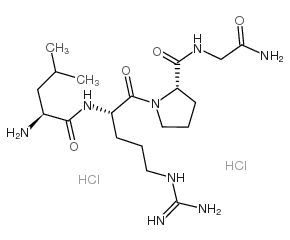Progress towards the development of non-peptide orally-active gonadotropin-releasing hormone (GnRH) antagonists: therapeutic implications.
R P Millar, Y F Zhu, C Chen, R S Struthers
文献索引:Br. Med. Bull. 56 , 761-772, (2000)
全文:HTML全文
摘要
Gonadotropin-releasing hormone (GnRH) is a decapeptide (pGlu-His-Trp-Ser-Tyr-Gly-Leu-Arg-Pro-Gly.NH2) which is produced from a precursor polypeptide in hypothalamic neurons and secreted in a pulsatile fashion to stimulate the secretion of LH and FSH via its interaction with a cognate receptor on gonadotropes. Low doses of the native peptide delivered in a pulsatile manner to mimic that found in the hypothalamic portal vessels restore fertility in hypogonadal patients, and are also effective in treating cryptorchidism and delayed puberty. Administration of high doses of GnRH, or agonist analogues, causes desensitization of the gonadotrope with consequent decline in gonadal gametogenesis and steroid and peptide hormone synthesis. This phenomenon finds extensive therapeutic application in clinical medicine in a wide spectrum of disease (Table 1). In addition, GnRH analogues have promise as new generation male and female contraceptives in conjunction with steroid hormone replacement. GnRH antagonists inhibit the reproductive system through competition with endogenous GnRH for the receptor and, in view of their rapid effects, are being increasingly used for the above mentioned applications. The peptide agonists and antagonists currently available require parenteral administration, typically in the form of long-acting depots. A new generation of non-peptide GnRH antagonists are beginning to emerge which should allow oral administration and, therefore, may provide greater flexibility of dosing, lower costs and increased patient acceptance.
相关化合物
| 结构式 | 名称/CAS号 | 分子式 | 全部文献 |
|---|---|---|---|
 |
GLP-HIS-TRP-SER-TYR-GLY-TRP-LEU-PRO-GLY-NH2
CAS:75690-75-4 |
C19H38Cl2N8O4 |
|
Effects of central administration of gonadotropin-releasing ...
2008-07-01 [Behav. Pharmacol. 19 , 308-316, (2008)] |
|
Structural requirement for the recognition of luteinizing ho...
1986-12-01 [Biochem. Cell Biol. 64 , 1372-1377, (1986)] |
|
Non-peptidic GnRH receptor antagonists. Armer RE, Smelt KH.
[Curr. Med. Chem. 11 , 33017-3028, (2004)] |